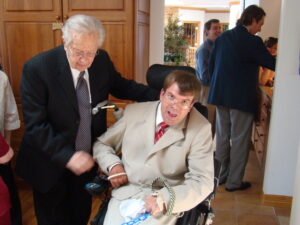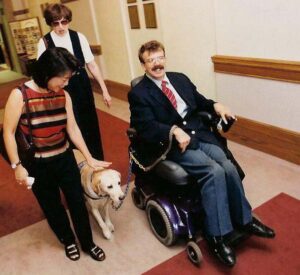
06 May Where does Disability Ministry Fit in Your Church
Disability ministry crosses the entire spectrum of a church’s ministry. Whether it’s the children’s ministry, the worship team, or the leadership, there is an element that could have a disability touch to it. During my years in this ministry, I have discovered that people don’t often understand what disability ministry is. They often ask me things like
- We need a class for children with special needs. Could you help us start one?
- We appreciate your ministry. Could you come to our church and talk to our children about disabilities?
- We have a youth living with Down syndrome in our Sunday school program. Could you come and train us in how to relate to him?
Interesting that it is always about children. I love to talk to young people about how to interact with people living with disabilities, and the young man living with Down syndrome certainly has a right to learn about Jesus. However, disability ministry doesn’t start or end with children. It is so much more. Churches must become aware that disability ministry reach across every ministry of a church.
I encourage you to begin to think about how interacting with someone living with disabilities can impact all the ministries at your church. What does it look like for the connection team, worship team, Children ministry all the way to the senior pastor to be involved with disabilities ministry? Even the building team has a role.
First, I want to describe what disability ministry is. Then I will discuss how it can work with each team. Disability ministry always has two parts to it.
The first part is what I will call public relations. This is my specialty. I teach people how to relate to someone living with a disability. What does the Bible say about disabilities and why should a church care? I bring in my story and help people understand how someone living with a disability can impact a church.
The second part is what I will call the nuts and bolts of ministry. This is where ministry gets dirty. It’s when people plan and carry out teaching about Jesus to people living with disabilities. It’s writing Bible studies, planning classes, organizing volunteers. I even read posts on Facebook about people designing sensory rooms. I wouldn’t know where to start with something like that. Except to have a ball pit. I love ball pits!
 This is important to understand as we look at your teams’ role with disability ministry. Each team should understand why disability ministry is important to the church, but how ministry is carried out will be different with every team. For example, a greeter might have just a few seconds welcoming a family on a Sunday morning while the youth leader will invest time with the teenager. The building team needs to understand why it’s important to have accessible bathrooms while the pastor walks aside the parents.
This is important to understand as we look at your teams’ role with disability ministry. Each team should understand why disability ministry is important to the church, but how ministry is carried out will be different with every team. For example, a greeter might have just a few seconds welcoming a family on a Sunday morning while the youth leader will invest time with the teenager. The building team needs to understand why it’s important to have accessible bathrooms while the pastor walks aside the parents.
DISABILITY MINISTRY WITHIN YOUR CHURCH’S TEAMS
Let us now look at how each team can affect disability ministry at your church.
We begin with the word hello. The Hospitality/connections team. This team is the first contact for visitors to the church. If someone living with a disability walk through the doors, people from the connection team should know how to relate to the person. Speak directly to the person, not to the caregiver. It’s okay to offer a handshake. If you can’t understand something or can’t answer a question, please don’t pretend you understand. Excuse yourself and go find someone who can help.
I don’t expect everything to be perfect when I visit a church. I don’t even expect people to understand me or have the perfect place to park my chair in the sanctuary. But I do except to be treated like a person. Talk to me in your normal voice and don’t be afraid to ask me to repeat myself if you don’t understand me. I’d rather walk away knowing you understood rather than wondering. The best thing you can do for someone with a disability is to take extra time and discover the person the Lord made him to be.
Congregational Care
One of my favorite lines I tell pastors is “you may not understand disability but you know the Lord, and that’s enough.” My other saying is that my disability doesn’t sheld me from death, depression, and other human needs. I need pastoral care.
The Congregational care team takes care of the church. Families affected by  disability certainly has issues that need to have a caring touch, but it’s more than that. These special families need the love of God.
disability certainly has issues that need to have a caring touch, but it’s more than that. These special families need the love of God.
When I meet with my pastor, my disability isn’t usually the issue. My pastor have already been through training on how to relate to me (actually through the years pastors had “on the job training” by just spending time with me) and we can get down to talking about my relationship with the Lord. Remember, while disability can be a major part of someone’s life, it’s probably not what drives him. Find that out, and you well on your way caring for someone with special needs.
Sunday School team
The Sunday school team is probably the team I work with the most. No wonder I get invitations to speak to Sunday school programs. It’s where parents bring their disabled children to learn about Jesus and kids question why their friend is in a wheelchair.
My passion is encouraging churches to integrate people living with disabilities into the life of the church. That means talking to the children about disabilities and helping teachers to integrate children with special needs into Sunday school program. Sometimes that means mainstreaming kids into the regular Sunday school program or designing a special class.
I have never attended a church that offered a class for children with special needs. My experiences from a young age have been children and adults alike attending Sunday school with people their age, and the church was always better for it. I recently witnessed this in the church I’m attending now.
Eden has Down syndrome and her family attends my church. The church has no special programs for Eden but yet she is accepted by the other children. They dance with her at the end of the service. They invite her to play and ask her to come over to there house. The children don’t see Eden’s disability; they only know she’s cool to hang out with and is able to see who Eden really is…a child of God.
Missions
Mission teams look to the outside world to do ministry. It does  everything from local soup kitchens to planning and supporting overseas trip. For disability ministry, this team should understand that every person has a right to hear the Gospel…even people who live with disabilities. Christians living with disabilities also have the right to serve on mission trips. Often he or she can reach people because of their disabilities.
everything from local soup kitchens to planning and supporting overseas trip. For disability ministry, this team should understand that every person has a right to hear the Gospel…even people who live with disabilities. Christians living with disabilities also have the right to serve on mission trips. Often he or she can reach people because of their disabilities.
I haven’t had the opportunity to serve on a mission trip, but I have served the Lord. I have been a reader,taught Sunday school, and volunteered at Vacation Bible School. Things don’t always go the way I would have liked, but I try to remember that I’m serving God and not there for myself.
I was was challenged with this thought when I volunteered to help run the games at the VBS. The week started okay as the guys tried to make sure I had something to do, but what I thought might happen happened. As the bustle of the week picked up, I got overlooked. My friends tried to include me…they really did. They gave me a bag of candy to trade with the kids, but I had a hard time making it known that I was playing the game. I tried to inch my way in and play a ball game with the kindergarteners one evening, but when that didn’t work, I wondered to the arts and crafts area and watched the kids work on their projects.
It could have been easy to get frustrated with the whole thing and give up, and believe me I fought those feelings all week. But I wasn’t there for myself. I was there for Jesus. Some day, those kids will remember the man in a wheelchair who hung out at a vacation bible school, and maybe that will inspire them to befriend a classmate who lives with a disability. That’s missions. That’s disability ministry in action.
Building/maintenance team
This team could be overlooked, but it’s important to disability ministry. As this team looks at building issues, it needs to be aware disability issues. Can a wheelchair get into the bathrooms? Is it feesible to have an automatic door? (I encourage large churches that have multiple activities throughout the week to have one, but smaller churches that are only open one or two days a week probably could get away from having one.) The mission of the building team should be to help people of all ages and abilities to worship Jesus Christ without physical barriers.
My first experience on a governing board was the trustees board of a church. The board’s responsibility was the upkeep of the building, and the pastor wanted my input on how the church could better service people living with disabilities. The first couple of months went well and the trustees installed electronic doors on two enterences. However, my time on trustees was limited. Broken furnaces and better signage took priority, and I quit going to meetings.
The Lord never wastes an opportunity, and I believe serving on the board was just the start of something bigger. First, it gave me experience of being on a board and learning how it works. I saw firsthand the politics and systems of a functioning board.
Second, and more importantly, the other members had a taste of disability ministry. As with my experience with VBS, the best thing I or anybody living with a disability can do is just show up. I said very little during the meetings, but I guarantee that I had an impact on the other members. They got to see someone who has a disability in a leadership position. This is the ultimate goal of a disability ministry.
Challenge
I’m guessing this vision is way too big for your church. That’s okay. Start small. Start with having a conversation with all the teams at your church about how best serve families affected by disability that come through your doors on a Sunday morning.


No Comments